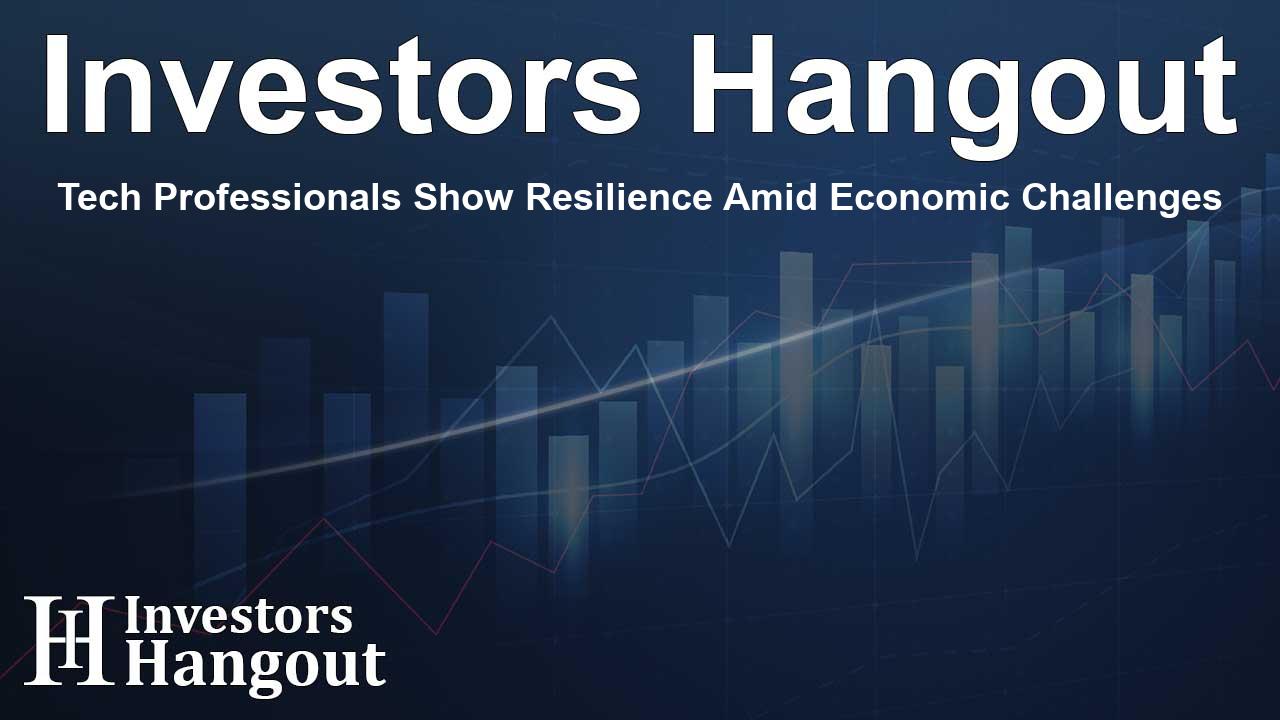Tech Professionals Show Resilience Amid Economic Challenges

Resilience Among Technology Professionals
In a landscape filled with economic uncertainties, technology professionals are displaying remarkable resilience and adaptability. This resilience is revealed in a recent report based on comprehensive surveys conducted among technology and human resources professionals. The findings shed light on the perspectives of tech professionals on career growth, economic conditions, and the impact of AI in their field.
Future Prospects in the Tech Industry
The recent 2024 Tech Sentiment Report offers valuable insights into the outlook of tech professionals as they navigate a year filled with challenges. Despite fluctuating economic conditions, many in the industry maintain a cautious optimism. The findings indicate that while some professionals feel pessimistic about the immediate future, a significant majority believe in the long-term growth of the tech sector. Notably, about 80% of tech professionals foresee an expansion in the industry over the next five years, reflecting a persistent belief in innovation and growth opportunities.
The Current Economic Landscape
While there are mixed sentiments regarding near-term economic conditions, tech professionals are actively adjusting their career paths to meet the evolving demands of the job market. Many are focusing on upskilling and embracing new learning opportunities, particularly in areas like artificial intelligence, cybersecurity, and data science, which continue to be in high demand.
Compensation and Job Changes
Compensation continues to be a key factor influencing job changes among tech professionals. Many indicate a willingness to switch jobs if it means an increase in salary. In fact, 76% of technology workers are engaging in side jobs to supplement their income, driven by rising living costs and the need for financial stability.
The Remote Work Dilemma
One of the significant topics in workforce discussions is remote work. The majority of tech professionals value the flexibility that comes with remote work options. According to the findings, 90% of surveyed tech professionals prioritize remote work when assessing potential job offers. The benefits highlighted include cost savings, improved productivity, and enhanced work-life balance.
Employer Expectations
Despite tech professionals’ preference for remote work, many employers are still advocating for hybrid work arrangements. This creates a tension within the industry, particularly as companies push for in-office presence. Employers enforcing in-office mandates may encounter dissatisfaction and disengagement among their workforce.
Career Satisfaction and Growth Opportunities
The report reveals a growing discontent among tech professionals regarding their current roles. Approximately 67% of respondents expressed interest in job changes, motivated by factors such as burnout and toxic work environments. However, the allure of bigger responsibilities and better compensation attracts many to larger tech firms, commonly referred to as Big Tech.
The Emerging AI Workforce
AI professionals are experiencing a particularly promising job market this year, showcasing higher rates of confidence in job security and work-life balance compared to their peers. The report highlights that 58% of AI professionals feel optimistic about securing favorable job opportunities, which significantly contrasts with the 36% of general tech workers who share this sentiment. This disparity signals the growing value placed on AI skills in today’s workforce.
Conclusion: Navigating an Evolving Landscape
The insights from the 2024 Tech Sentiment Report underline a dynamic and evolving tech industry. While challenges abound, there is a strong sense of community and innovation driving professionals forward. Understanding the sentiments and priorities of tech professionals is crucial for employers looking to attract and retain top talent in this competitive market.
Frequently Asked Questions
What does the 2024 Tech Sentiment Report reveal?
The report highlights both the challenges and optimism felt by tech professionals amidst economic uncertainties, focusing on job expectations and growth within the industry.
How do compensation trends affect job changes for tech professionals?
Compensation remains the top motivational factor for tech professionals considering job changes, with many opting for side gigs to enhance their financial stability.
Why is remote work important for tech professionals?
Remote work is prioritized by tech professionals for its benefits, including flexibility, cost-effectiveness, and enhanced work-life balance.
What challenges do AI professionals face in the job market?
While AI professionals are in demand, HR teams often struggle with recruiting due to a knowledge gap and the competitiveness of the market.
What are the main factors driving dissatisfaction among tech professionals?
Dissatisfaction is largely driven by burnout and poor workplace environments, motivating many professionals to seek new job opportunities.
About Investors Hangout
Investors Hangout is a leading online stock forum for financial discussion and learning, offering a wide range of free tools and resources. It draws in traders of all levels, who exchange market knowledge, investigate trading tactics, and keep an eye on industry developments in real time. Featuring financial articles, stock message boards, quotes, charts, company profiles, and live news updates. Through cooperative learning and a wealth of informational resources, it helps users from novices creating their first portfolios to experts honing their techniques. Join Investors Hangout today: https://investorshangout.com/
Disclaimer: The content of this article is solely for general informational purposes only; it does not represent legal, financial, or investment advice. Investors Hangout does not offer financial advice; the author is not a licensed financial advisor. Consult a qualified advisor before making any financial or investment decisions based on this article. The author's interpretation of publicly available data shapes the opinions presented here; as a result, they should not be taken as advice to purchase, sell, or hold any securities mentioned or any other investments. The author does not guarantee the accuracy, completeness, or timeliness of any material, providing it "as is." Information and market conditions may change; past performance is not indicative of future outcomes. If any of the material offered here is inaccurate, please contact us for corrections.